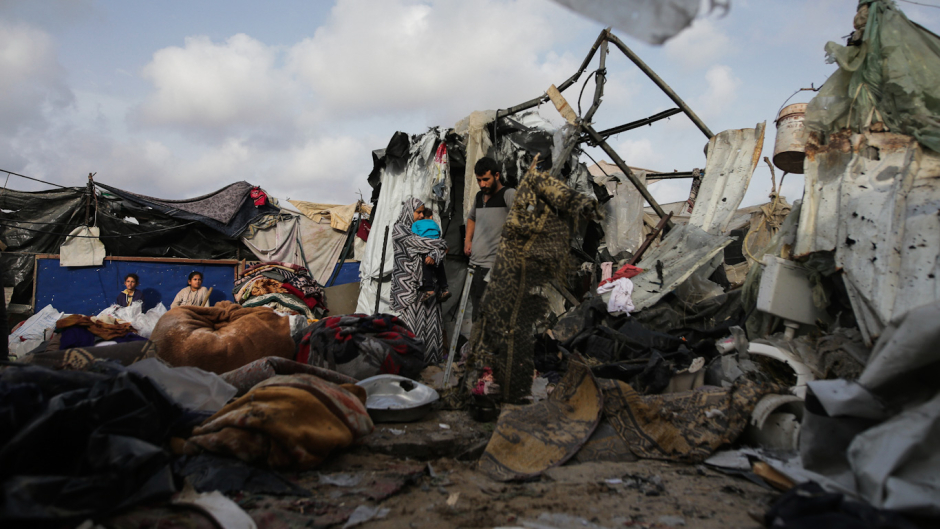President Joe Biden's long-overdue demand for both sides to accept a Gaza ceasefire proposal appears to be faltering under Israeli refusal to comply, an escalation of Israel's offensive in Rafah, and contradictions between the proposal and the president's speech.
On May 31, President Joe Biden issued what many considered a long-overdue call for both Israel and Hamas to accept an Israeli ceasefire proposal to end the war in the Gaza Strip. In the speech, he briefly outlined the phases of the proposal, stating it would be "a road map to an enduring ceasefire and the release of all hostages."
According to unnamed officials in the Biden administration, the timing and manner of the president's announcement were designed to pressure Israeli Prime Minister Benjamin Netanyahu to accept it.
Shortly afterward, however, Benjamin Netanyahu publicly stated that his regime's ceasefire was aimed at the destruction of Hamas. He affirmed his intention to continue the war in Gaza until victory is achieved against the Palestinian resistance movement. This directly contradicted the spirit of President Biden's speech, implying that despite the ceasefire agreement with Hamas, it would still enable the dismantling of the group.
The confusion resulting from these conflicting narratives triggered an adverse reaction from ministers within the Israeli premier's ruling coalition, including members of Netanyahu's Likud Party. Israeli Security Minister Itamar Ben Gvir announced that his Jewish Power Party would suspend its role in the ruling coalition until the terms of the ceasefire proposal were made available to him.
According to polling data released in March, around 50% of Israelis support the idea of Israel taking control of the Gaza Strip in a post-war situation. Only 10% approved of the Palestinian Authority running Gaza, and none of the respondents favored Hamas remaining in power.
While most Israeli Jews do not believe that Benjamin Netanyahu is winning the war in Gaza, the polling data suggests that the majority of Israelis want the war to continue and feel that Israel has either used enough or not enough force in Gaza.
On the other hand, Hamas officials heavily criticized President Biden's portrayal of the group as obstructing the deal. They pointed to what they labeled as blatant Israeli intransigence and highlighted contradictions between the actual proposal and how the U.S. president represented it.
Majed Al-Ansari, Qatar's foreign ministry spokesperson, said, "We are waiting for a clear Israeli position that represents the entire government in response to the U.S.'s Gaza proposal."
Hamas initially received the Biden administration's initiative "positively" but maintains that any viable ceasefire proposal must lead to the complete withdrawal of Israeli forces from Gaza and the end of the war.
Meanwhile, Israel has ramped up its offensive actions in the Gaza Strip, advancing with its invasion of Rafah despite the International Court of Justice's ruling ordering Tel Aviv to halt its offensive there.
Not only has Israel continued its military actions in the Rafah area, but it has also launched new incursions into the central region of the besieged coastal enclave as the daily death toll continues to climb. On Thursday, an Israeli airstrike targeted a UN school in the Nuseirat Refugee Camp, killing around 45 civilians, half of whom were women and children.
A recent leak of the details of the ceasefire proposal, as reported by The Economist, appears to contradict President Biden's presentation of the Israeli deal being offered. The article noted that the proposal would be much more difficult to conclude in phases two and three than the president had suggested.
Israeli Prime Minister Benjamin Netanyahu called Biden's representation of the ceasefire proposal "inaccurate." As the Israeli military continues to increase its operations in the Gaza Strip and the Palestinian civilian death toll rises, hope appears to be faltering.
On May 6, Hamas accepted a ceasefire proposal. However, the Israeli government responded by immediately launching its Rafah offensive and seizing the Rafah Crossing between Gaza and Egypt. This move violated Israel's 1979 Camp David normalization agreement with Egypt and led to the breakdown of ceasefire talks.
Feature photo |Displaced Palestinians inspect their tents destroyed by Israeli bombing next to a United Nations facility near Rafah city, Gaza Strip, May 28, 2024. Jehad Alshrafi |AP
Robert Inlakesh is a political analyst, journalist and documentary filmmaker currently based in London, UK. He has reported from and lived in the occupied Palestinian territories and hosts the show 'Palestine Files'. Director of 'Steal of the Century: Trump's Palestine-Israel Catastrophe'. Follow him on Twitter @falasteen47
